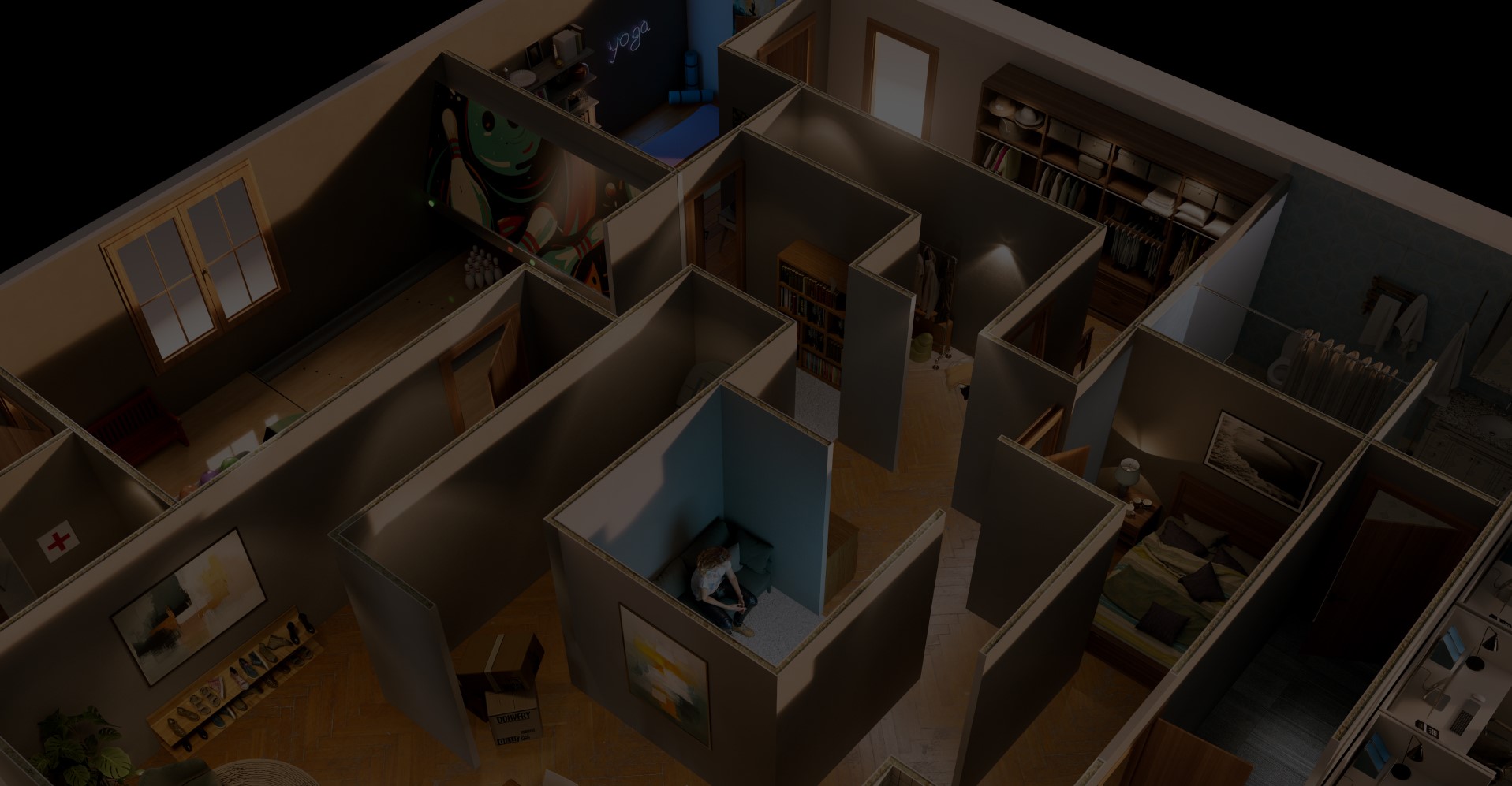The ‘Out of the Maze’ film
Watch the confusing and challenging maze of severe depression unfold through Carl and Olivia’s story and how they are able to navigate it together.


Severe depression is a consuming and debilitating condition that can feel inescapable, whether you are living with the condition or caring for someone with it.
It can leave the people experiencing or witnessing it feeling broken, disconnected, and hopeless, making every aspect of life seem impossible. In the search for a way out towards recovery, both groups encounter twists, turns, and setbacks along the way, making life feel like a maze from which it seems impossible to escape.
However, with perseverance and the right support and information, recovery is possible. It might feel challenging, but by working together, the caregiver and person living with severe depression can find a way out of the maze.

Watch the confusing and challenging maze of severe depression unfold through Carl and Olivia’s story and how they are able to navigate it together.

Explore the maze in full-screen
Explore the maze in full-screen
Severe depression can manifest itself differently from one person to the next. Its symptoms often include loss of interest in everyday activities, disturbances in sleep, appetite or sexual desire, suicidal thoughts and slowing of speech and action, all of which place a significant burden on the everyday lives of the people living with the condition.1,2
Alongside speciality medical care, the key to navigating the maze of severe depression is partnering with someone to help find a way out.3,4,5 When a caregiver — be it a friend, family member, dear one, or simply someone who stands out in the patient’s life — steps in and plays an active and optimistic role, they can help a person living with severe depression find the right care and treatment, keeping them engaged and active in medical discussions.6,7
Together, they can persevere to find a way out of the maze.

If you are a caregiver, whether that be a family member, significant other, friend or colleague, your actions and support play an integral part in helping someone navigate the maze of severe depression.
Some of the most impactful steps you can take include:
Encouraging them to continue with specialist medical care, despite any obstacles6
Staying actively involved in their medical journey6
It’s also important to recognise the importance of small actions – whether that be accompanying them to a medical appointment, listening intently or even going to the store to purchase food or everyday goods on their behalf. In many cases, actions can “speak” much louder and be more impactful.
It can be difficult to step in and support someone you know who is living with severe depression as you witness them fight for themselves. You may even experience constant pushback from the person you are trying to help, which can lead to you both feeling like you are facing a roadblock.
Providing care for someone living with severe depression requires you to take care of yourself as well. This means setting clear boundaries between what you can manage and what requires the expertise of a trained professional. It's also essential to make time for your own well-being and ensure you have a robust support network to rely on.
But no matter how hard it feels, with perseverance, the right support and information, you can show that recovery is possible and contribute towards it. By working together, you and the person living with severe depression can find a way out of the maze.

There isn't one set route out of depression. Whatever route people take, supportive conversations with a doctor or another healthcare professional are often crucial.
Most people who seek help successfully find ways to manage depression as well as get to the way out of this journey.

Open and honest conversations about depression are an important step towards ensuring that people get the support they need. However, we understand that starting these conversations can be daunting and knowing where to begin can be difficult.
That’s why we have worked to develop The Little Book of Big Conversations. This digital book is full of small pieces of practical advice to help make those big conversations about depression a little bit easier.

The Global Alliance of Mental Illness Advocacy Networks-Europe (GAMIAN-Europe) is a patient-driven pan-European organisation that represents the interests of persons affected by mental illness and advocates for their rights.
If you are worried about your mental health, or someone else’s, visit GAMIAN-Europe for more information. In an emergency situation, get help immediately by calling the emergency services or your local mental health helpline.

The European Federation of Associations of Families of People with Mental Illness (EUFAMI) is a carer-driven European, non-profit organisation that represents the family members of persons affected by mental ill health so that their rights and interests are recognised and protected.
If you are caring for someone living with a mental health disorder and would like additional support, you can find resources on the EUFAMI website.
2 9 7 6 8
people are Breaking Depression together...
Cleveland Clinic. Major Depressive Disorder. Available at: https://my.clevelandclinic.org/health/diseases/24481-clinical-depression-major-depressive-disorder. Date accessed: September 2024
McIntyre RS, Alsuwaidan M, Baune BT, Berk M, Demyttenaere K, Goldberg JF, Gorwood P, Ho R, Kasper S, Kennedy SH, Ly-Uson J, Mansur RB, McAllister-Williams RH, Murrough JW, Nemeroff CB, Nierenberg AA, Rosenblat JD, Sanacora G, Schatzberg AF, Shelton R, Stahl SM, Trivedi MH, Vieta E, Vinberg M, Williams N, Young AH, Maj M. Treatment-resistant depression: definition, prevalence, detection, management, and investigational interventions. World Psychiatry. 2023 Oct;22(3):394-412. doi: 10.1002/wps.21120. PMID: 37713549; PMCID: PMC10503923. Available at: https://www.ncbi.nlm.nih.gov/pmc/articles/PMC10503923/. Date accessed: September 2024.
Schön U-K, Denhov A, Topor A. Social Relationships as a Decisive Factor in Recovering From Severe Mental Illness. International Journal of Social Psychiatry. 2009;55(4):336-347. doi:10.1177/0020764008093686.
Barger, S.D., Messerli-Bürgy, N. & Barth, J. Social relationship correlates of major depressive disorder and depressive symptoms in Switzerland: nationally representative cross sectional study. BMC Public Health 14, 273 (2014).https://doi.org/10.1186/1471-2458-14-273. Date accessed: September 2024.
Svendsen, M.L., Ellegaard, T., Jeppesen, K.A. et al. Family involvement and patient-experienced improvement and satisfaction with care: a nationwide cross-sectional study in Danish psychiatric hospitals. BMC Psychiatry 21, 190 (2021).https://doi.org/10.1186/s12888-021-03179-1. Available at: https://bmcpsychiatry.biomedcentral.com/articles/10.1186/s12888-021-03179-1 Date accessed: September 2024.
The Mayo Clinic. Depression: Supporting a family member or friend, Available at: https://www.mayoclinic.org/diseases-conditions/depression/in-depth/depression/art-20045943. Date accessed: September 2024.
Mind. Seeking help for a mental health problem. Available at: https://www.mind.org.uk/information-support/guides-to-support-and-services/seeking-help-for-a-mental-health-problem/helping-someone-else-seek-help/. Last accessed: September 2024.
2 9 7 6 8
people are Breaking Depression together...